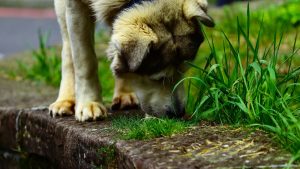Dogs often tend to chew on items within our households such as paper or any other suitable materials. On the other hand, one of their favorite snacks consists of the grass growing rampantly in our yards.
The ongoing debate about the root cause of why dogs ingest grass is akin to the unexplainable chicken-egg paradox. Veterinary professionals can’t appear to make a consensus on whether canines consume grass as a catalyst for vomiting or regurgitating after having ingested it. If a dog is observed indulging in grass ingestion, it is almost definite that this will result in vomiting. Everyone can concur on this fact, no matter what the rationale for such behavior may be.
Dogs may consume grass for different reasons. One possible theory is that their diet might not be providing adequate amounts of nutritional value they would find in leafy vegetables. Additionally, if a dog feels an upset stomach, it might be entirely instinctual to eat grass as a remedy thus inducing vomiting and providing relief. Grass aids in soothing obnoxious irritants from a canine’s stomach, making them feel better. Many canines with delicate/fragile appetites tend to ingest grass, which causes diarrhea and vomiting as a conscious response to the bile collected in the absence of food. Consuming grass can evolve into a learned behavior for some dogs, triggered when they detect a pleasing aroma and then ingesting it. Becoming developed over time from repeating this action, their fondness for grass may grow with each session.

Canines often demonstrate the seemingly strange habit of consuming grass, but typically it is not harmful. Dogs’ particular preference towards long, decorative grass or tall weeds may explain why they so often get caught up in noshing on such vegetation; particularly when it’s swaying in the wind. Animals can munch on grass safely and without any detrimental effects, provided it isn’t incorporated into their daily diets and it is free from potentially toxic chemicals. When using pesticides for lawn care, make sure to adhere to the manufacturer’s instructions, as many of these sprays need to dry before animals may come. Don’t let your pooch ingest the grass in that region; certain mushrooms quickly blooming in a yard can be potentially hazardous. For pet owners with four-legged companions who like to graze, make sure to routinely inspect the area to ensure that no toxic mushrooms have emerged.
If your dog is a frequent consumer of grass, resulting in vomiting afterward, it is important to consult your vet. Dietary fiber could help with preventing bile or empty boiling sensations if increased. Thus, speaking with your vet may be recommended in terms of ruling out any potential stomach problems. Carrots are considered nourishing choices, however, bear in mind that consistent high sugar content may be detrimental.
Feeding your pet in smaller portions but more often during the day is a great way to keep them satiated and satisfied. Additionally, adding a treat or cookie before they go to bed creates an extra comfortable night for them. Grass-eating in pets can be indicative of an upset stomach, often triggered by stress or anxiety symptoms such as separation, fear, barking, or crying. If your pet is experiencing these behaviors then consulting with a veterinarian or dog trainer is recommended to identify the underlying cause.
To ensure the wellness of both yourself and your beloved pet, take safety-first measures to make their environment as secure as possible. This will provide a peaceful atmosphere and ensure no possible harm to your dog.
 wagwagtail "only love can make your dog wag her tail"
wagwagtail "only love can make your dog wag her tail"
